Business Law Assignment: Company Law, Contracts, and Exclusion Clauses
VerifiedAdded on 2020/11/23
|7
|1814
|266
Homework Assignment
AI Summary
This business law assignment addresses several key concepts, including the principle of Solomon v Solomon Ltd, the concept of legal personality, and the implications for company directors and members regarding liability. The assignment further analyzes a contract law case involving Betterstage Ltd and Bamber, focusing on the principle of consideration and existing obligations. Finally, it provides advice to Ian regarding the liability of Bikeit Ltd in a scenario involving an exclusion clause on a rental agreement. The analysis incorporates relevant case law and legal principles to provide comprehensive solutions to the issues presented. The document provides an in-depth analysis of the legal concepts and their practical application in business scenarios.

Business law
Paraphrase This Document
Need a fresh take? Get an instant paraphrase of this document with our AI Paraphraser
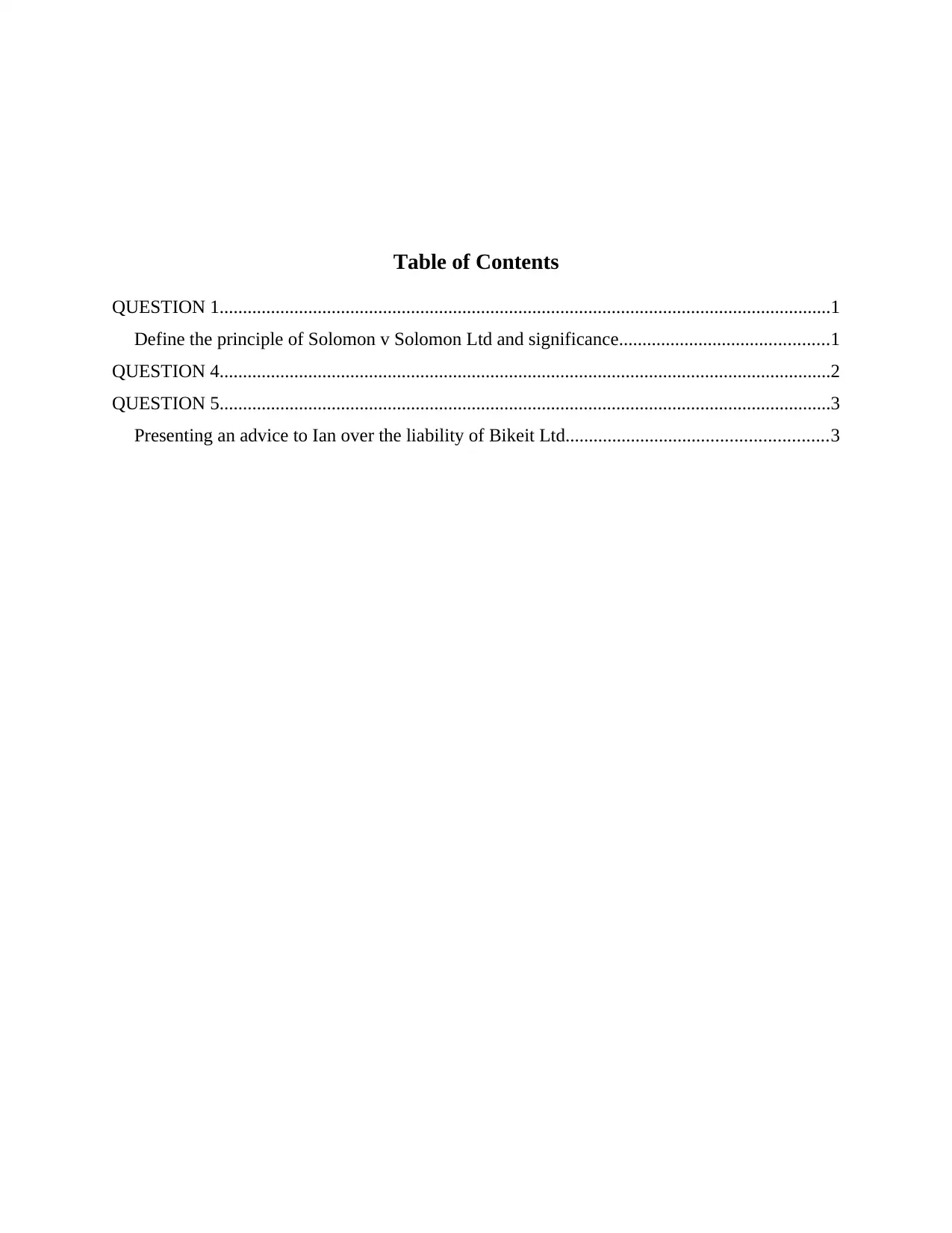
Table of Contents
QUESTION 1...................................................................................................................................1
Define the principle of Solomon v Solomon Ltd and significance.............................................1
QUESTION 4...................................................................................................................................2
QUESTION 5...................................................................................................................................3
Presenting an advice to Ian over the liability of Bikeit Ltd........................................................3
QUESTION 1...................................................................................................................................1
Define the principle of Solomon v Solomon Ltd and significance.............................................1
QUESTION 4...................................................................................................................................2
QUESTION 5...................................................................................................................................3
Presenting an advice to Ian over the liability of Bikeit Ltd........................................................3
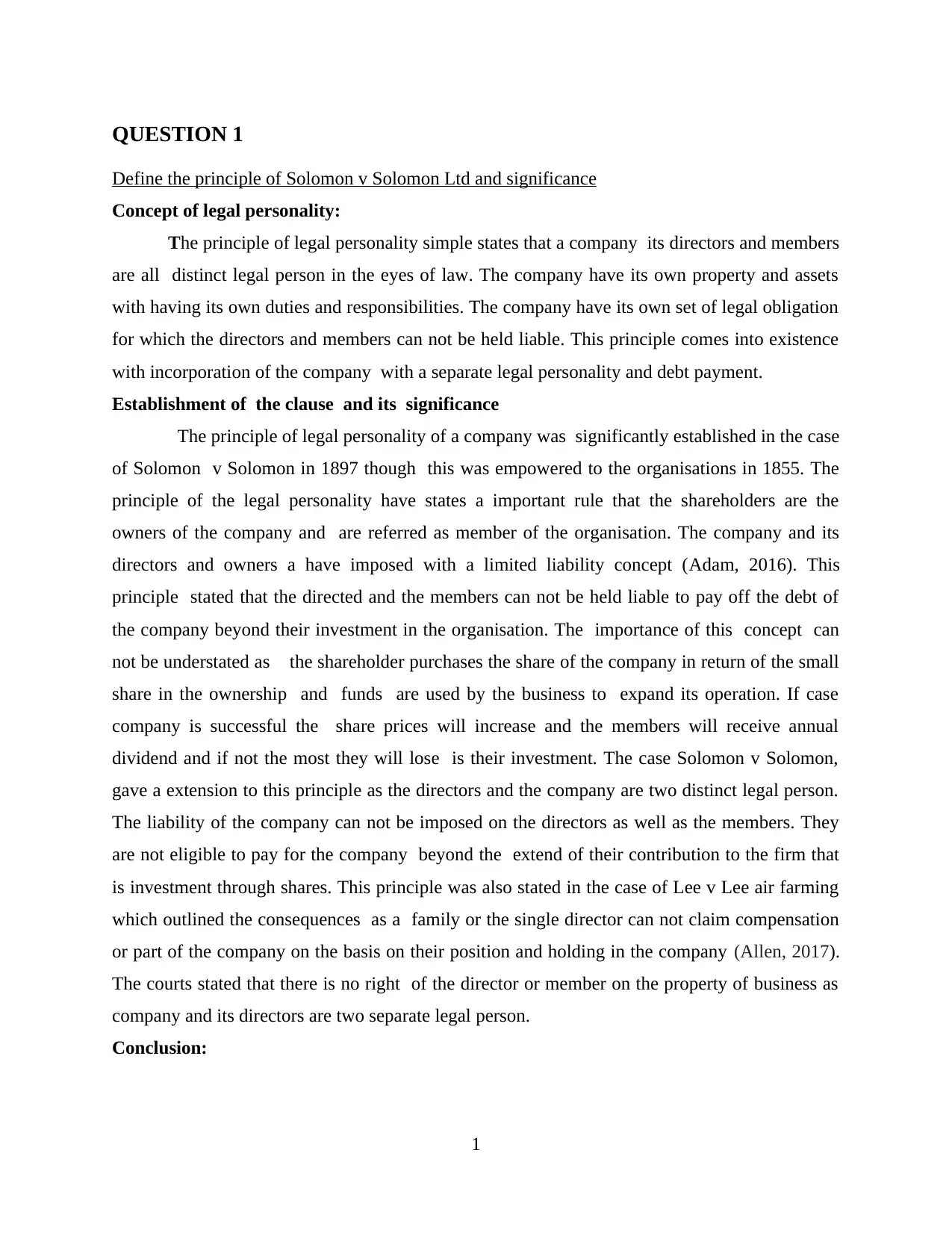
QUESTION 1
Define the principle of Solomon v Solomon Ltd and significance
Concept of legal personality:
The principle of legal personality simple states that a company its directors and members
are all distinct legal person in the eyes of law. The company have its own property and assets
with having its own duties and responsibilities. The company have its own set of legal obligation
for which the directors and members can not be held liable. This principle comes into existence
with incorporation of the company with a separate legal personality and debt payment.
Establishment of the clause and its significance
The principle of legal personality of a company was significantly established in the case
of Solomon v Solomon in 1897 though this was empowered to the organisations in 1855. The
principle of the legal personality have states a important rule that the shareholders are the
owners of the company and are referred as member of the organisation. The company and its
directors and owners a have imposed with a limited liability concept (Adam, 2016). This
principle stated that the directed and the members can not be held liable to pay off the debt of
the company beyond their investment in the organisation. The importance of this concept can
not be understated as the shareholder purchases the share of the company in return of the small
share in the ownership and funds are used by the business to expand its operation. If case
company is successful the share prices will increase and the members will receive annual
dividend and if not the most they will lose is their investment. The case Solomon v Solomon,
gave a extension to this principle as the directors and the company are two distinct legal person.
The liability of the company can not be imposed on the directors as well as the members. They
are not eligible to pay for the company beyond the extend of their contribution to the firm that
is investment through shares. This principle was also stated in the case of Lee v Lee air farming
which outlined the consequences as a family or the single director can not claim compensation
or part of the company on the basis on their position and holding in the company (Allen, 2017).
The courts stated that there is no right of the director or member on the property of business as
company and its directors are two separate legal person.
Conclusion:
1
Define the principle of Solomon v Solomon Ltd and significance
Concept of legal personality:
The principle of legal personality simple states that a company its directors and members
are all distinct legal person in the eyes of law. The company have its own property and assets
with having its own duties and responsibilities. The company have its own set of legal obligation
for which the directors and members can not be held liable. This principle comes into existence
with incorporation of the company with a separate legal personality and debt payment.
Establishment of the clause and its significance
The principle of legal personality of a company was significantly established in the case
of Solomon v Solomon in 1897 though this was empowered to the organisations in 1855. The
principle of the legal personality have states a important rule that the shareholders are the
owners of the company and are referred as member of the organisation. The company and its
directors and owners a have imposed with a limited liability concept (Adam, 2016). This
principle stated that the directed and the members can not be held liable to pay off the debt of
the company beyond their investment in the organisation. The importance of this concept can
not be understated as the shareholder purchases the share of the company in return of the small
share in the ownership and funds are used by the business to expand its operation. If case
company is successful the share prices will increase and the members will receive annual
dividend and if not the most they will lose is their investment. The case Solomon v Solomon,
gave a extension to this principle as the directors and the company are two distinct legal person.
The liability of the company can not be imposed on the directors as well as the members. They
are not eligible to pay for the company beyond the extend of their contribution to the firm that
is investment through shares. This principle was also stated in the case of Lee v Lee air farming
which outlined the consequences as a family or the single director can not claim compensation
or part of the company on the basis on their position and holding in the company (Allen, 2017).
The courts stated that there is no right of the director or member on the property of business as
company and its directors are two separate legal person.
Conclusion:
1
⊘ This is a preview!⊘
Do you want full access?
Subscribe today to unlock all pages.

Trusted by 1+ million students worldwide
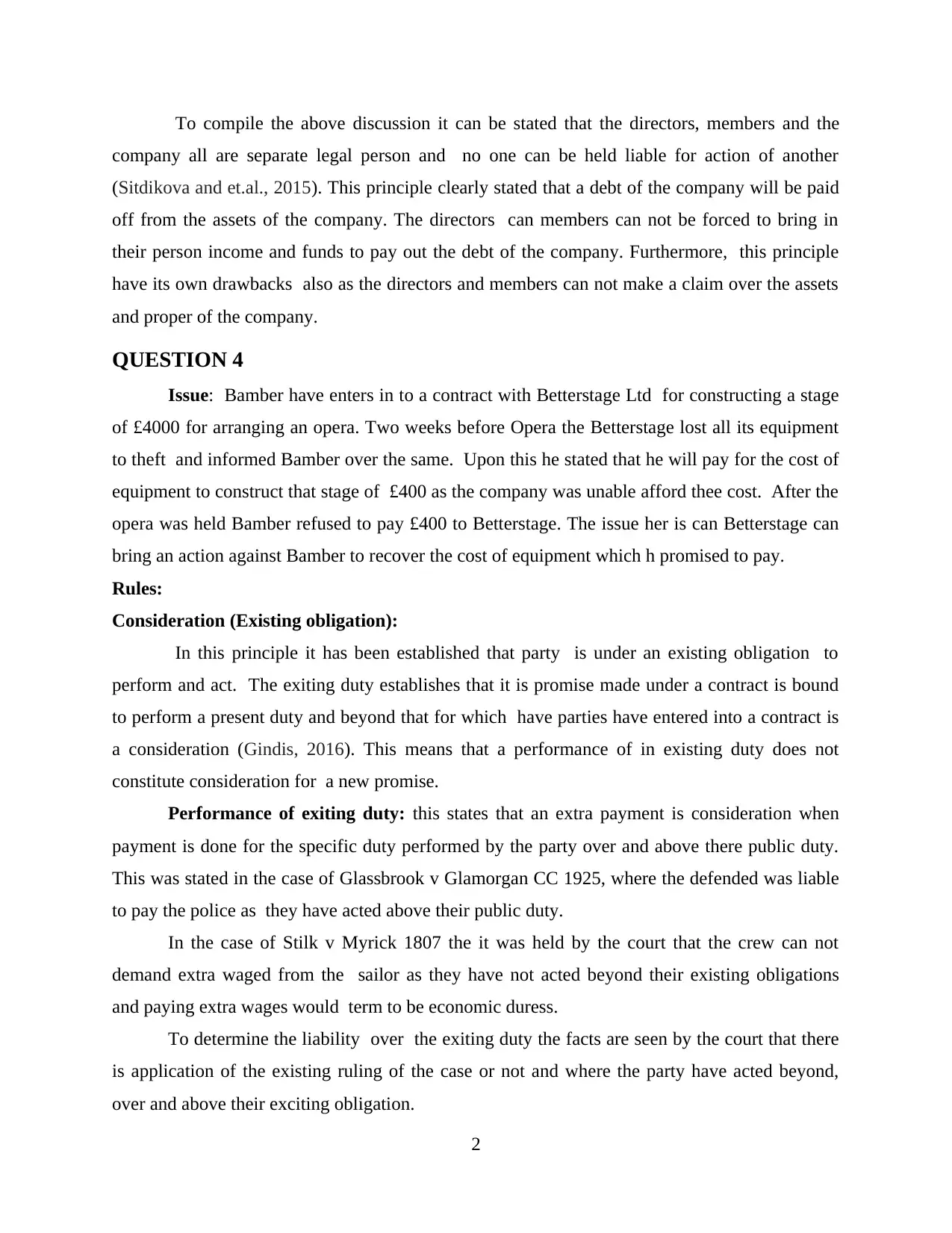
To compile the above discussion it can be stated that the directors, members and the
company all are separate legal person and no one can be held liable for action of another
(Sitdikova and et.al., 2015). This principle clearly stated that a debt of the company will be paid
off from the assets of the company. The directors can members can not be forced to bring in
their person income and funds to pay out the debt of the company. Furthermore, this principle
have its own drawbacks also as the directors and members can not make a claim over the assets
and proper of the company.
QUESTION 4
Issue: Bamber have enters in to a contract with Betterstage Ltd for constructing a stage
of £4000 for arranging an opera. Two weeks before Opera the Betterstage lost all its equipment
to theft and informed Bamber over the same. Upon this he stated that he will pay for the cost of
equipment to construct that stage of £400 as the company was unable afford thee cost. After the
opera was held Bamber refused to pay £400 to Betterstage. The issue her is can Betterstage can
bring an action against Bamber to recover the cost of equipment which h promised to pay.
Rules:
Consideration (Existing obligation):
In this principle it has been established that party is under an existing obligation to
perform and act. The exiting duty establishes that it is promise made under a contract is bound
to perform a present duty and beyond that for which have parties have entered into a contract is
a consideration (Gindis, 2016). This means that a performance of in existing duty does not
constitute consideration for a new promise.
Performance of exiting duty: this states that an extra payment is consideration when
payment is done for the specific duty performed by the party over and above there public duty.
This was stated in the case of Glassbrook v Glamorgan CC 1925, where the defended was liable
to pay the police as they have acted above their public duty.
In the case of Stilk v Myrick 1807 the it was held by the court that the crew can not
demand extra waged from the sailor as they have not acted beyond their existing obligations
and paying extra wages would term to be economic duress.
To determine the liability over the exiting duty the facts are seen by the court that there
is application of the existing ruling of the case or not and where the party have acted beyond,
over and above their exciting obligation.
2
company all are separate legal person and no one can be held liable for action of another
(Sitdikova and et.al., 2015). This principle clearly stated that a debt of the company will be paid
off from the assets of the company. The directors can members can not be forced to bring in
their person income and funds to pay out the debt of the company. Furthermore, this principle
have its own drawbacks also as the directors and members can not make a claim over the assets
and proper of the company.
QUESTION 4
Issue: Bamber have enters in to a contract with Betterstage Ltd for constructing a stage
of £4000 for arranging an opera. Two weeks before Opera the Betterstage lost all its equipment
to theft and informed Bamber over the same. Upon this he stated that he will pay for the cost of
equipment to construct that stage of £400 as the company was unable afford thee cost. After the
opera was held Bamber refused to pay £400 to Betterstage. The issue her is can Betterstage can
bring an action against Bamber to recover the cost of equipment which h promised to pay.
Rules:
Consideration (Existing obligation):
In this principle it has been established that party is under an existing obligation to
perform and act. The exiting duty establishes that it is promise made under a contract is bound
to perform a present duty and beyond that for which have parties have entered into a contract is
a consideration (Gindis, 2016). This means that a performance of in existing duty does not
constitute consideration for a new promise.
Performance of exiting duty: this states that an extra payment is consideration when
payment is done for the specific duty performed by the party over and above there public duty.
This was stated in the case of Glassbrook v Glamorgan CC 1925, where the defended was liable
to pay the police as they have acted above their public duty.
In the case of Stilk v Myrick 1807 the it was held by the court that the crew can not
demand extra waged from the sailor as they have not acted beyond their existing obligations
and paying extra wages would term to be economic duress.
To determine the liability over the exiting duty the facts are seen by the court that there
is application of the existing ruling of the case or not and where the party have acted beyond,
over and above their exciting obligation.
2
Paraphrase This Document
Need a fresh take? Get an instant paraphrase of this document with our AI Paraphraser
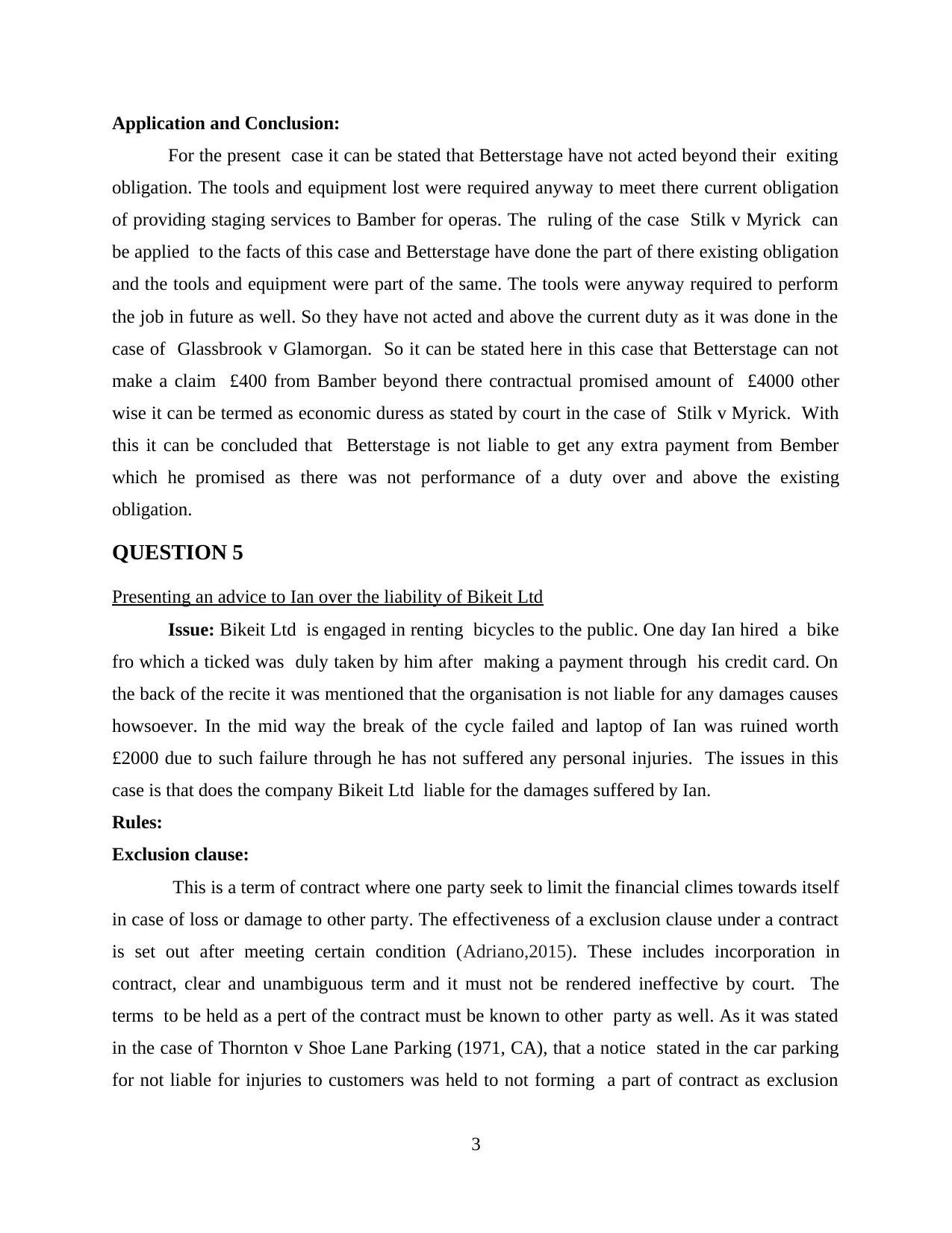
Application and Conclusion:
For the present case it can be stated that Betterstage have not acted beyond their exiting
obligation. The tools and equipment lost were required anyway to meet there current obligation
of providing staging services to Bamber for operas. The ruling of the case Stilk v Myrick can
be applied to the facts of this case and Betterstage have done the part of there existing obligation
and the tools and equipment were part of the same. The tools were anyway required to perform
the job in future as well. So they have not acted and above the current duty as it was done in the
case of Glassbrook v Glamorgan. So it can be stated here in this case that Betterstage can not
make a claim £400 from Bamber beyond there contractual promised amount of £4000 other
wise it can be termed as economic duress as stated by court in the case of Stilk v Myrick. With
this it can be concluded that Betterstage is not liable to get any extra payment from Bember
which he promised as there was not performance of a duty over and above the existing
obligation.
QUESTION 5
Presenting an advice to Ian over the liability of Bikeit Ltd
Issue: Bikeit Ltd is engaged in renting bicycles to the public. One day Ian hired a bike
fro which a ticked was duly taken by him after making a payment through his credit card. On
the back of the recite it was mentioned that the organisation is not liable for any damages causes
howsoever. In the mid way the break of the cycle failed and laptop of Ian was ruined worth
£2000 due to such failure through he has not suffered any personal injuries. The issues in this
case is that does the company Bikeit Ltd liable for the damages suffered by Ian.
Rules:
Exclusion clause:
This is a term of contract where one party seek to limit the financial climes towards itself
in case of loss or damage to other party. The effectiveness of a exclusion clause under a contract
is set out after meeting certain condition (Adriano,2015). These includes incorporation in
contract, clear and unambiguous term and it must not be rendered ineffective by court. The
terms to be held as a pert of the contract must be known to other party as well. As it was stated
in the case of Thornton v Shoe Lane Parking (1971, CA), that a notice stated in the car parking
for not liable for injuries to customers was held to not forming a part of contract as exclusion
3
For the present case it can be stated that Betterstage have not acted beyond their exiting
obligation. The tools and equipment lost were required anyway to meet there current obligation
of providing staging services to Bamber for operas. The ruling of the case Stilk v Myrick can
be applied to the facts of this case and Betterstage have done the part of there existing obligation
and the tools and equipment were part of the same. The tools were anyway required to perform
the job in future as well. So they have not acted and above the current duty as it was done in the
case of Glassbrook v Glamorgan. So it can be stated here in this case that Betterstage can not
make a claim £400 from Bamber beyond there contractual promised amount of £4000 other
wise it can be termed as economic duress as stated by court in the case of Stilk v Myrick. With
this it can be concluded that Betterstage is not liable to get any extra payment from Bember
which he promised as there was not performance of a duty over and above the existing
obligation.
QUESTION 5
Presenting an advice to Ian over the liability of Bikeit Ltd
Issue: Bikeit Ltd is engaged in renting bicycles to the public. One day Ian hired a bike
fro which a ticked was duly taken by him after making a payment through his credit card. On
the back of the recite it was mentioned that the organisation is not liable for any damages causes
howsoever. In the mid way the break of the cycle failed and laptop of Ian was ruined worth
£2000 due to such failure through he has not suffered any personal injuries. The issues in this
case is that does the company Bikeit Ltd liable for the damages suffered by Ian.
Rules:
Exclusion clause:
This is a term of contract where one party seek to limit the financial climes towards itself
in case of loss or damage to other party. The effectiveness of a exclusion clause under a contract
is set out after meeting certain condition (Adriano,2015). These includes incorporation in
contract, clear and unambiguous term and it must not be rendered ineffective by court. The
terms to be held as a pert of the contract must be known to other party as well. As it was stated
in the case of Thornton v Shoe Lane Parking (1971, CA), that a notice stated in the car parking
for not liable for injuries to customers was held to not forming a part of contract as exclusion
3
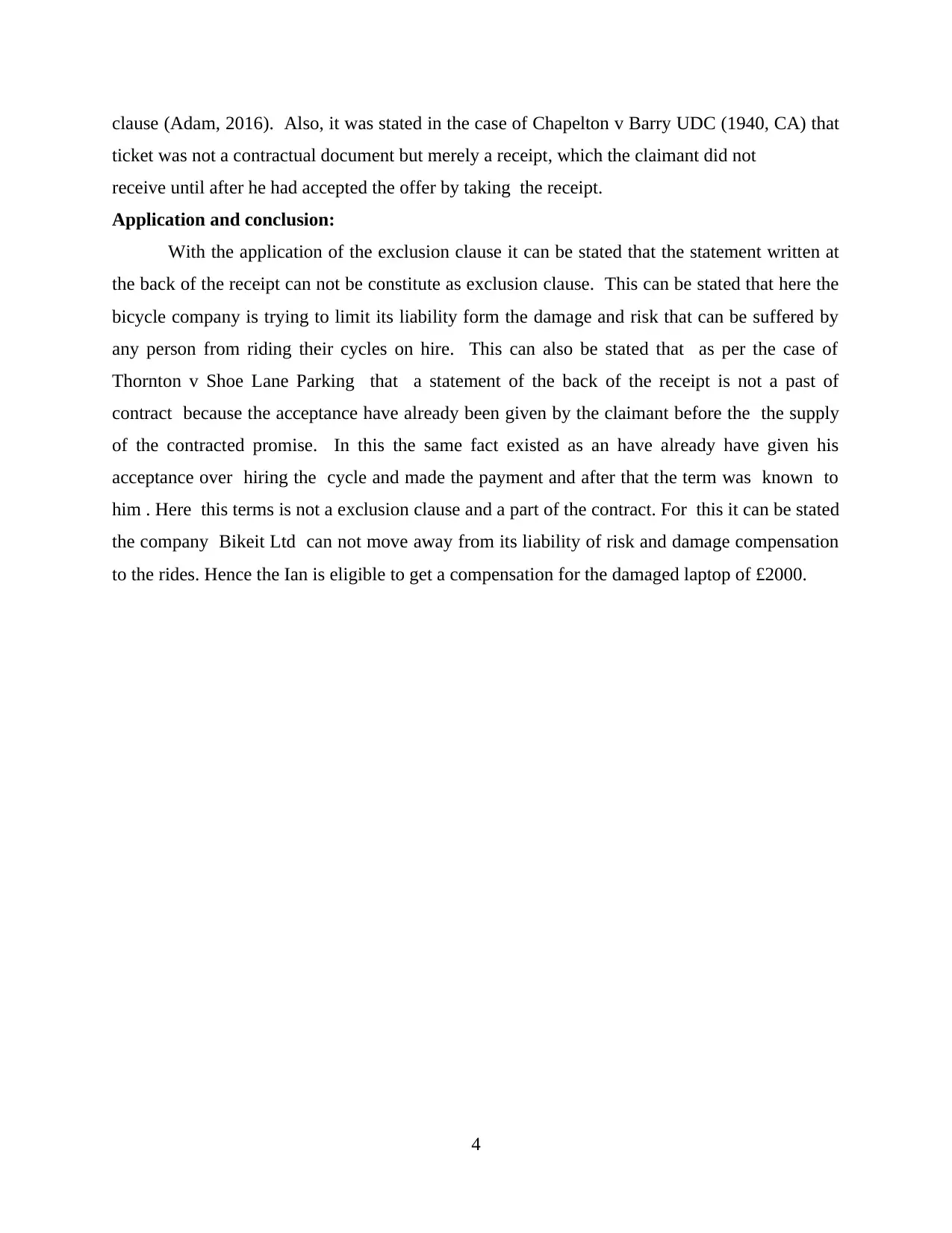
clause (Adam, 2016). Also, it was stated in the case of Chapelton v Barry UDC (1940, CA) that
ticket was not a contractual document but merely a receipt, which the claimant did not
receive until after he had accepted the offer by taking the receipt.
Application and conclusion:
With the application of the exclusion clause it can be stated that the statement written at
the back of the receipt can not be constitute as exclusion clause. This can be stated that here the
bicycle company is trying to limit its liability form the damage and risk that can be suffered by
any person from riding their cycles on hire. This can also be stated that as per the case of
Thornton v Shoe Lane Parking that a statement of the back of the receipt is not a past of
contract because the acceptance have already been given by the claimant before the the supply
of the contracted promise. In this the same fact existed as an have already have given his
acceptance over hiring the cycle and made the payment and after that the term was known to
him . Here this terms is not a exclusion clause and a part of the contract. For this it can be stated
the company Bikeit Ltd can not move away from its liability of risk and damage compensation
to the rides. Hence the Ian is eligible to get a compensation for the damaged laptop of £2000.
4
ticket was not a contractual document but merely a receipt, which the claimant did not
receive until after he had accepted the offer by taking the receipt.
Application and conclusion:
With the application of the exclusion clause it can be stated that the statement written at
the back of the receipt can not be constitute as exclusion clause. This can be stated that here the
bicycle company is trying to limit its liability form the damage and risk that can be suffered by
any person from riding their cycles on hire. This can also be stated that as per the case of
Thornton v Shoe Lane Parking that a statement of the back of the receipt is not a past of
contract because the acceptance have already been given by the claimant before the the supply
of the contracted promise. In this the same fact existed as an have already have given his
acceptance over hiring the cycle and made the payment and after that the term was known to
him . Here this terms is not a exclusion clause and a part of the contract. For this it can be stated
the company Bikeit Ltd can not move away from its liability of risk and damage compensation
to the rides. Hence the Ian is eligible to get a compensation for the damaged laptop of £2000.
4
⊘ This is a preview!⊘
Do you want full access?
Subscribe today to unlock all pages.

Trusted by 1+ million students worldwide
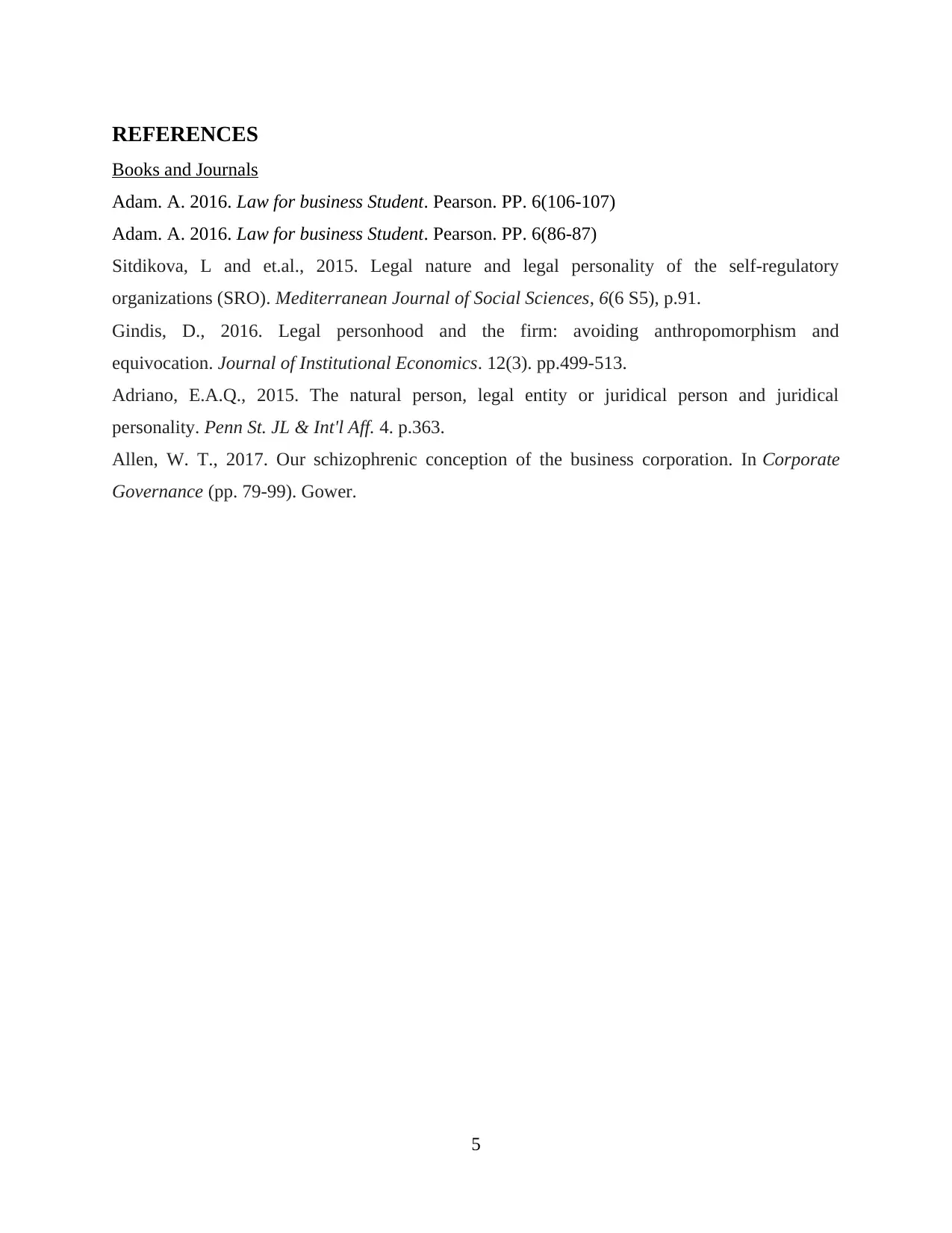
REFERENCES
Books and Journals
Adam. A. 2016. Law for business Student. Pearson. PP. 6(106-107)
Adam. A. 2016. Law for business Student. Pearson. PP. 6(86-87)
Sitdikova, L and et.al., 2015. Legal nature and legal personality of the self-regulatory
organizations (SRO). Mediterranean Journal of Social Sciences, 6(6 S5), p.91.
Gindis, D., 2016. Legal personhood and the firm: avoiding anthropomorphism and
equivocation. Journal of Institutional Economics. 12(3). pp.499-513.
Adriano, E.A.Q., 2015. The natural person, legal entity or juridical person and juridical
personality. Penn St. JL & Int'l Aff. 4. p.363.
Allen, W. T., 2017. Our schizophrenic conception of the business corporation. In Corporate
Governance (pp. 79-99). Gower.
5
Books and Journals
Adam. A. 2016. Law for business Student. Pearson. PP. 6(106-107)
Adam. A. 2016. Law for business Student. Pearson. PP. 6(86-87)
Sitdikova, L and et.al., 2015. Legal nature and legal personality of the self-regulatory
organizations (SRO). Mediterranean Journal of Social Sciences, 6(6 S5), p.91.
Gindis, D., 2016. Legal personhood and the firm: avoiding anthropomorphism and
equivocation. Journal of Institutional Economics. 12(3). pp.499-513.
Adriano, E.A.Q., 2015. The natural person, legal entity or juridical person and juridical
personality. Penn St. JL & Int'l Aff. 4. p.363.
Allen, W. T., 2017. Our schizophrenic conception of the business corporation. In Corporate
Governance (pp. 79-99). Gower.
5
1 out of 7
Related Documents
Your All-in-One AI-Powered Toolkit for Academic Success.
+13062052269
info@desklib.com
Available 24*7 on WhatsApp / Email
![[object Object]](/_next/static/media/star-bottom.7253800d.svg)
Unlock your academic potential
Copyright © 2020–2026 A2Z Services. All Rights Reserved. Developed and managed by ZUCOL.





